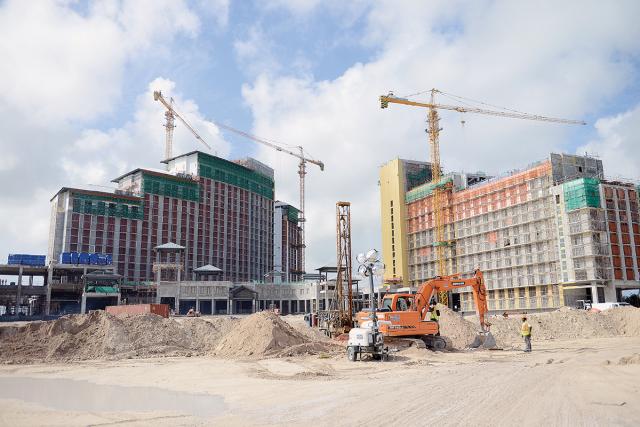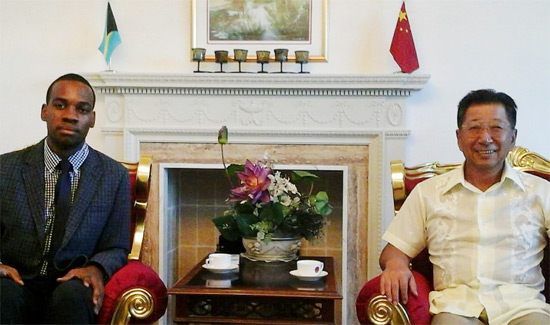Following last week’s groundbreaking ceremony, Bahamian and Chinese labor are set to commence construction at Baha Mar. The nature of the labor component of the mega-resort has proven controversial as it will be the largest single-phase resort development ever built in the Caribbean.
For point of reference, the labor to build Atlantis at Paradise Island has been overwhelmingly Bahamian as this mega-resort has developed in stages over the course of more than a decade.
Primarily constructed by the China State Construction Engineering Co. Ltd and financed by the Export-Import Bank of China, Baha Mar will be the first tourism project the companies have invested in overseas. For financing and other reasons, they are eager to construct the resort as quickly and as less costly as possible.
Given this reality, concessions had to be made to proceed with a project that will significantly help to stimulate the economy. Still, the amount of foolish talk that has surrounded the labor component is significant, from the uproariously ridiculous to the garden-variety.
As Baha Mar set to break ground last week, the Opposition noted: “The labor issues (at Baha Mar) are purely of the making of the FNM and Hubert Ingraham’s stop review and cancel program. We think that we ought to make the best of an unfortunate situation on the labour front.”
REDACTED
In this version of events, the back story has been heavily redacted, including the preface, introduction and opening chapter of the Baha Mar story. Was it not the PLP that chose Baha Mar to redevelop Cable Beach?
It is curious how an Opposition that wishes to maximize its credit for Baha Mar continues to deflect responsibility for other controversial decisions, including minimizing or whitewashing the mistakes it made at the genesis of the project. Hubert Ingraham would not have pursued developers who lacked the funds or financing to spur the redevelopment of Cable Beach.
And, it is precisely the financing needs of Baha Mar and the large scope of its plans that have overwhelmingly driven the labor component. Those needs arose in a Bahamian context of a national labor pool limited by numbers and adequate training in various skill-sets.
Moreover, the developers had to contend with a global financial meltdown which led them to perhaps the most reliable source of capital they could find given the large and rapid scale of their plans combining multiple phases into one. Brimming with capital to spend, financially and politically, the Chinese insisted on a particular schedule, leveraging their ready cash and secure financing.
But it is not only those at home who continue to ignore how we got to this point, some out of mischief and others because of denial and wishful-thinking. Some of the commentators from overseas have also ignored certain realities on the ground in The Bahamas.
This past November a Washington D.C.-based columnist hailing from the Caribbean offered his views on Baha Mar as Prime Minister Ingraham headed to China for talks on a range of issues including Baha Mar.
Entitled, “China putting the squeeze on The Bahamas; Your country may be next…”, the column made the rounds locally. Widely circulated through emails, it was also discussed on the internet and in the print media.
The writer made a number of good and provocative points, addressing broader issues with which the wider Caribbean and indeed many developing countries will have to contend as China emerges as a superpower.
OVERREACHED
Still, in significant ways, the columnist overreached, sometimes failing to fully appreciate the Bahamian context in the rush to perhaps advance certain predeterminations. The view from Washington D.C. is not necessarily the view from Nassau or many other Caribbean capitals.
Commentary requires getting the facts as correct as possible, such as the demographics and labor component in The Bahamas. Despite the columnist’s assertion, it is not correct to say that The Bahamas is “teeming with unemployed men (and women) who are willing and able to do the work”.
This inaccuracy was repeated by the Center for Immigration Studies, a U.S. think-tank which also got its facts wrong in stating that all the workers needed for Baha Mar “could be easily drawn from the Bahamas labor pool”.
The Center seems to have paid scant attention to the Baha Mar debate at home concerning the lack of critical skills among the available Bahamian labor pool. During his China trip, the Prime Minister got additional labor concessions including $8 million for training as well as for more Bahamians working on the core project.
Some clues about the center’s mindset about the Baha Mar deal may be found at columnist Kenric Ward’s blog which suggested that the immigration non-profit took “a dim view of this latest Chinese export scheme.”
Seemingly, the prejudice is that when the Chinese do business overseas, it’s a scheme, while the U.S. doing so around the world is simply good business. Then there’s this curiosity from Mr. Ward: “While the Bahamian government is understandably dragging its feet on Beijing’s request, tens of thousands of unemployed construction workers remain idle in Florida. Go figure.”
Is the suggestion that American workers should be brought in to fill construction jobs at Baha Mar? This is self-contradictory and a nonstarter as Ward’s blog approvingly quotes the immigration center’s view that the workforce for Baha Mar “could be easily drawn from the Bahamas labor pool”.
Still, if the idea is to hire American labor, would they really want to work at a Chinese export scheme? Of course, American labor is already working on Chinese export schemes — in America. And, why would China be interested in funding thousands of jobs for Americans at the project rather than its citizens?
The facts are clear: We do have unemployed workers willing to work as well as various skilled labor. But, we do not have nearly the number of Bahamians required and qualified to build the over $2 billion project unless the scheduled time frame is over a decade. The Bahamas did not even have enough skilled workers to build the Cable Beach Hotel which was smaller in scope.
Meanwhile, the Washington D.C.-based columnist baldly stated: “And nothing demonstrated its [China’s] modus operandi in this respect quite like the way it allegedly bribed (or attempted to bribe) every nation in the region to sever ties with Taiwan: almost all of them, including The Bahamas, duly complied.”
OFFENSIVE
This statement is offensive to many countries in the region that recognized the People’s Republic of China for the reasons that most of the rest of the world and the United States did. It made sense to recognize a nation of over a billion people instead of a province of approximately 23 million.
Prime Minister Ingraham and his government must be surprised and piqued by the charge of alleged or attempted bribery to establish diplomatic relations with China in 1997. The columnist doesn’t know Hubert Ingraham and he apparently doesn’t understand the foreign affairs of The Bahamas.
The notion that countries in the region had to be bribed to recognize the People’s Republic is an insult to the intelligence of the leaders and people of the region. Meanwhile, Taiwan continues to induce a number of small states to continue to recognize it rather than the People’s Republic. One of them, our CARICOM partner, Belize, is so indebted to Taiwan that it has virtually cut itself off from one of the world’s major powers.
While commentators and think-tanks may indulge their passions and ideologies, Caribbean governments must pursue foreign policies based on cool reason and realism, not succumb to delusions. Moreover, they must balance how to simultaneously address both national sentiments and various foreign policy considerations.
Even as various commentators and pundits advanced questionable analysis on Baha Mar, pandering by the Opposition on the labor component won’t win it many votes nor impress our Chinese partner or the developer the Opposition chose to redevelop Cable Beach.
There are key elements of the Baha Mar deal that remain problematic for many Bahamians. But as the Opposition noted, “we ought to make the best” of the situation, much of which was initially put in place by the Opposition.
By: “Simon”
Source: Front Porch column
The Nassau Guardian



